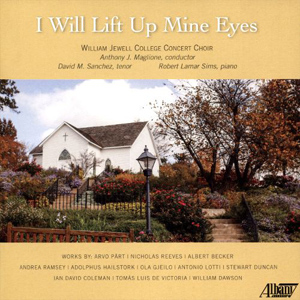There was a recurring sketch on the Sesame Street television program called “One of these things is not like the others”; you were shown four things and had to choose which one “didn’t belong”. This recording of choral music by the William Jewell College Concert Choir reminded me of that because one of the works–a three-movement cantata–so clearly doesn’t belong with the rest, and as a result seriously interrupts the balance and flow of an otherwise well-chosen, cohesive concert program. Unfortunately the one that doesn’t belong is the program’s title piece.
I wasn’t familiar with the William Jewell College Concert Choir (based in Liberty, Missouri), but throughout the disc’s first four numbers–beginning with a superb rendering of Arvo Pärt’s oft-recorded Bogoroditse Devo–it was easy to be impressed, not only with the sound, ensemble, and responsiveness of the choir, but with the choice of music–the Pärt followed by three engaging yet not well-known works, including a world-premiere recording (Nicholas Reeves’ Lord, Now Lettest), Albert Becker’s Ich bin die Auferstehung, and Andrea Ramsey’s Luminescence. All of these are a cappella, their styles and moods complementary, conceptually centered–as are almost all the works on the program–on choral sound and texture, and on exploring text and color through particular harmonic/melodic features–again, as a function of a pure choral sound, which this choir effectively communicates and executes, especially in the above-mentioned pieces by Reeves and Ramsey, Ola Gjeilo’s The Spheres (from “Sunrise” Mass), and Stewart Duncan’s Within These Walls.
The problem I mention comes following the fourth piece, Ramsey’s truly “luminescent” Luminescence. With jarring suddenness, an exceptionally zealous piano explodes out of nowhere, and seemingly from a different space than the previous music, an introduction of pounding, slashing chords, followed shortly by the voice of a very vigorous, exuberant tenor, and we’re off, somewhere far from where we just were–a context and style so different that you can’t help be at least temporarily disoriented as a listener. Nothing against the music itself, Adolphus Hailstork’s I Will Lift Up Mine Eyes, a setting of three Psalm texts originally scored for orchestra, which certainly would be better heard that way, and in a context that would allow us to really appreciate it.
The program then continues as it began, with six more a cappella works, in different yet complementary styles, from Gjeilo to Lotti, and concludes with the Kyrie from Victoria’s Officium Defunctorum Mass and one of William Dawson’s best-loved spirituals, Soon Ah Will Be Done, beautifully, affectingly sung. An acoustic a little less “airy”, and a bit less emphasis on the bass would have shown this choir’s refined sound and ensemble technique to even better effect. I really enjoyed getting to know this fine choir and several works I hadn’t heard before–and, happily for those interested, publisher information is provided.
































